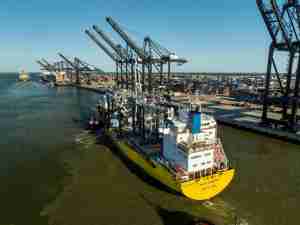Virginia region’s growing coffee-related industry gains more ground as delivery point
posted by AJOT | Jul 16 2014 at 02:32 PM | Ports & Terminals
The coffee roasting, packaging and handling industry that is a growing area of business for The Port of Virginia was given a boost this week when the port was certified as a delivery point on the ICE Futures U.S. Coffee “C”® futures contract.
On Monday (July 14), the port was selected by ICE to be a delivery point, or exchange port, for the coffee futures contract. The designation allows owners of exchange-graded coffee imports coming to Virginia and stored in local, exchange-licensed warehouses to be delivered against the coffee “C” futures contract.
“This exchange port status is very positive news for The Port of Virginia and the growth of the region’s industry surrounding this commodity,” said John F. Reinhart, CEO and executive director of the Virginia Port Authority. “The port’s coffee volumes the first five months of 2014 have increased by 20 percent when compared with 2013 and by 56 when compared with 2012 (on an annual basis). This is the second-largest coffee port on US East Coast and we believe this designation presents some very good opportunities for growth over the long-term.”
ICE operates the coffee “C” futures contract, the world benchmark for Arabica coffee. That benchmark price is built upon the physical delivery of exchange-grade green beans, from 19 foreign countries of origin to a licensed warehouse located in ports in the U.S. and Europe, with pre-set premiums/discounts for ports and growths.
Prior to the addition of Virginia, the only domestic delivery points for coffee that could be traded in the “C” futures contract were New York, Miami, New Orleans and Houston.
Locally, the beans are stored at RPM Warehousing & Transportation in Norfolk and Continental Terminals Inc., in Chesapeake.
The designation was supported by research data provided by the Green Coffee Association (“GCA”) and the port. The research, based on 2013 statistics, showed that Virginia ranked fifth in the United States with 8 percent of total GCA stocks. Moreover, the port provided data showing significant volumes of coffee imports from several key points of origin in each of the past four years, including Colombia, Brazil, Guatemala, Peru, Honduras and Mexico. The Exchange determined that the volumes of C-style Arabica coffees moving through and stored in the Port of Virginia were sufficient to merit status as a delivery point.
“The application process started in 2013 and it is very competitive; other US East Coast peers were seeking the same designation,” Reinhart said. “Virginia had a very strong application because of many established businesses in the arena like Green Mountain, Massimo Zanetti, Mountanos Brothers, the J.M. Smucker Co. and warehouses like RPM and Continental that support this commodity.”
The change to the futures contract is effective Sept. 2016: the first Exchange deliveries in the port cannot occur until that date.










